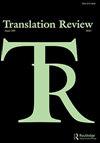Adonis
IF 0.3
3区 文学
0 LANGUAGE & LINGUISTICS
引用次数: 0
Abstract
Adonis (Ali Ahmad Sa`id) (b. 1930) is one of the most influential and dominant Arab poets of the modern era and a perennial Nobel contender since the late 1980s. A number of his individual works have been ably and beautifully translated into English in previous decades by Samuel Hazo and Shawkat Toorawa. More recently, Adnan Haydar and Michael Beard translated Adonis’s most powerful and enduring work, Aghani Mihyar alDimashqi (1961), as Mihyar of Damascus: His Songs. However, a book of selections spanning Adonis’s entire oeuvre since the late 1950s is still lacking in English. The volume under review was an ambitious attempt to remedy this conspicuous gap in the Anglophone world. The pieces in Selected Poems were chosen from fourteen individual works published between 1957 and 2008, and fill almost four hundred pages. Adonis’s early and mid-career works have stood the test of time, but even his most ardent fans would agree that his later works, those written in the past two decades, lack his legendary verve. The exception is the multivolume al-Kitab (The Book), a poetic journey through Arab history and culture narrated by its greatest poet, the tenthcentury al-Mutanabbi. Adonis began working on it in the mid1970s and published the first of its four volumes in 1995. Mattawa decided not to include any excerpts from al-Kitab because, as he states in the introduction to Selected Poems: “no small sample . . . would offer an adequate sense of the work’s scope” (xxiv). This is not very convincing. There is no doubt that al-Kitab is complex and challenging, but a representative excerpt or excerpts would have enriched this book. The first volume of al-Kitab has been translated and published in French and the second is forthcoming from Seuil. Selections from three of Adonis’s later works (Prophesy, O Blind One [2003], Beginnings of the Body, Ends of the Sea [2003], and Printer of the Planets’ Books [2008]), all written in the past decade or so, take up a hundred pages, almost one-fourth of the whole book. Some of this space could have been better served by featuring further selections from earlier and more enduring works. One would expect a bibliography of the original Arabic works and editions the translator used, but there is none. The translator’s short introduction includes a few glitches. Adonis never advocated the use of dialect in poetry (xvi). On the contrary, his disagreements over this issue caused a major rift with Yusuf al-Khal (1917–87), and Adonis eventually left Shi`r, the pioneering journal the two had co-founded in Beirut. The names of major classical Arab poets who influenced Adonis are mistransliterated; “Abu Nawwas” (ix, 396) should be “Abu Nuwas,” “al-Mutannabi” (ix, xix, xx, xi) should be “alMutanabbi,” and “al-Ma`ari” (xix, xxi, 274, 395) should be “alMa`arri.” So are classical terms such as “al-Mu`tazala” (xii) (group of rational thinkers), which should be “al-Mu`tazila.” Even the title of Adonis’s most famous collection is wrong; “Ughniyat” (xvi) should be “Aghani Mihyar al-Dimashqi” (“The Songs of Mihyar of Damascus”). On their own these are minor errors, but, alas, they are symptomatic of serious misreadings of the short vowels in scores of words in the original Arabic in many of the poems throughout this volume. Moreover, four hundred pages of poetry, much of which has references to, and is in conversation with, figures from ArabIslamic history and Islamic mysticism, produces only four pages of notes. This is far too meager and could have been expanded to illuminate the context and intertexts of many a poem for the benefit of the reader. One example out of many is when Adonis includes a line from al-Ma`arri (973–1058): “Jasadi khirqatun tukhatu ila ‘l-ardi / faya kha’ita ‘l-`awalimi khitni” (My body is a rag being sewn to the earth / O you who sew the worlds, sew me). This is rendered “The body is a rag dragged on earth / Walls of the world, support me” (278), a rendering semantically way off the mark. “Kha’it” (one who sews) becomes “ha’it” (wall) and “khitni” (sew me) becomes “support me.” A note on al-Ma`arri’s poem and the particular notion of man’s return to dust would have helped the reader. When Adonis embeds lines from the eighth-century `Abdulrahman al-Dakhil in his poem, the reader is not told and is left to think they are Adonis’s (68). The same occurs in “Body” from “Singular in Plural Form.” Adonis references two lines from al-Tawhidi (930– 1023): “Zahiri muntathirun la amluku minhu shay`an / wa batini musta`irun la ajidu lahu fay`an,” but there is no note pointing this out and the meaning is completely lost on the translator. Instead of something like “My exterior is scattered and I possess none of it / My interior burns and I can find no shade for it,” we get the following: “my surfaces spread and I own none of them / my insides reduced no place in them for me to live” (125). Adonis’s poetry often employs Qur’anic references and metaphors. These escape the translator, too, and are mistranslated. For example, in “Concerto for 11th September,” “sundus Allah” is translated “cedars of God” (303), but “sundus” means “silk” or “brocade” and appears three times in the Qur’an. The Qur’naic Lote tree (Qur’an 53:14) “sidrat alMuntaha” also becomes “cedar.”阿多尼斯(Ali Ahmad Sa 'id)(生于1930年)是现代最有影响力和最具统治力的阿拉伯诗人之一,自20世纪80年代末以来一直是诺贝尔奖的竞争者。在过去的几十年里,他的一些个人作品被塞缪尔·哈佐和肖克特·图拉瓦巧妙而优美地翻译成英文。最近,阿德南·海达尔和迈克尔·比尔德将阿多尼斯最具影响力、最经久不衰的作品《阿格哈尼·米哈耶尔·大马士革》(1961)翻译为《大马士革的米哈耶尔:他的歌曲》。然而,一本囊括阿多尼斯自20世纪50年代末以来全部作品的选集仍然缺乏英文版本。正在审查的这本书是一次雄心勃勃的尝试,试图弥补英语世界中这一明显的差距。《诗选》选自1957年至2008年间出版的14部个人作品,将近400页。阿多尼斯职业生涯早期和中期的作品经受住了时间的考验,但即使是他最狂热的粉丝也会同意,他在过去20年里创作的晚期作品,缺乏他传奇的神韵。唯一的例外是多卷本的《书》(al-Kitab),这是一部由阿拉伯最伟大的诗人、十世纪的穆塔纳比(al-Mutanabbi)讲述的穿越阿拉伯历史和文化的诗意之旅。阿多尼斯在20世纪70年代中期开始研究这本书,并于1995年出版了四卷书中的第一卷。Mattawa决定不收录任何来自al-Kitab的节选,因为正如他在《诗选》的引言中所说:“没有小样本……将提供对工作范围的充分感觉”(xxiv)。这不是很令人信服。毫无疑问,al-Kitab是复杂和具有挑战性的,但一个或几个有代表性的摘录将丰富这本书。《al-Kitab》第一卷已翻译成法文出版,第二卷即将从Seuil出版。阿多尼斯后期的三部作品(《预言》、《啊,瞎子》[2003]、《身体的开始》、《海的尽头》[2003]和《行星的印刷者》[2008])的选段都是在过去十年左右完成的,总共有一百页,几乎占了整本书的四分之一。如果更多地选择一些更早期、更持久的作品,这些空间本可以得到更好的利用。人们期望有一份原始阿拉伯语作品的参考书目和译者使用的版本,但是没有。译者的简短介绍中有一些小纰漏。阿多尼斯从不提倡在诗歌中使用方言(16)。相反,他在这个问题上的分歧导致了他与优素福·阿尔卡勒(Yusuf al-Khal, 1917-87)的重大分歧,阿多尼斯最终离开了两人在贝鲁特共同创办的先驱杂志《什叶派》。影响阿多尼斯的主要古典阿拉伯诗人的名字被误译;“Abu Nawwas”(ix, 396)应该是“Abu Nuwas”,“al-Mutannabi”(ix, xix, xx, xi)应该是“alMutanabbi”,“al-Ma 'ari”(xix, xxi, 274,395)应该是“alMa 'arri”。诸如“al-Mu 'tazala”(十二)(理性思想家群体)这样的经典术语也是如此,它应该是“al-Mu 'tazila”。甚至阿多尼斯最著名的作品集的标题都是错误的;“Ughniyat”(十六)应该是“Aghani Mihyar al-Dimashqi”(“大马士革的Mihyar之歌”)。就其本身而言,这些都是小错误,但是,唉,它们是严重误读阿拉伯语原文中许多单词短元音的症状。此外,400页的诗歌,其中大部分引用了阿拉伯伊斯兰历史和伊斯兰神秘主义的人物,并与之对话,只产生了四页的注释。这实在是太少了,为了读者的利益,可以扩展到阐明许多诗歌的上下文和互文。其中一个例子是阿多尼斯引用了al-Ma ' arri(973-1058)中的一句话:“Jasadi khirqatun tukhatu ila ' l-ardi / faya kha ' ita ' l- ' awalimi khitni”(我的身体是一块缝在地球上的碎布/呵,你缝合了世界,请缝合我)。这是“身体是一块拖在地上的破布/世界的墙壁,支持我”(278),一个语义上偏离目标的渲染。“Kha 'it”(缝纫的人)变成了“ha 'it”(墙),“khitni”(缝我)变成了“支持我”。对al-Ma 'arri这首诗的注释以及人类回归尘土的特定概念可能会对读者有所帮助。当阿多尼斯在他的诗中插入八世纪的《Abdulrahman al-Dakhil》中的诗句时,读者并没有被告知,而是认为它们是阿多尼斯的(68)。“复数形式的单数”在“身体”中也出现了同样的情况。阿多尼斯引用了al-Tawhidi(930 - 1023)中的两句话:“Zahiri muntathirun la amluku minhu shayan / wa batini musta 'irun la ajidu lahu fay 'an”,但没有注释指出这一点,翻译人员完全失去了意思。而不是像“我的外表是分散的,我没有拥有它/我的内心燃烧,我找不到它的阴影,”我们得到以下:“我的表面分散,我没有拥有它们/我的内心没有减少我生活的地方”(125)。阿多尼斯的诗歌经常引用古兰经的典故和隐喻。 这些逃亡的翻译员也是错误的。例如,在9月11日的协奏曲中,“神的圣日”被翻译为“神的圣日”(303),但是“圣日”的意思是“丝绸”或“布洛德斯”,在古兰经中出现了三次。《古兰经》
本文章由计算机程序翻译,如有差异,请以英文原文为准。
求助全文
约1分钟内获得全文
求助全文

 求助内容:
求助内容: 应助结果提醒方式:
应助结果提醒方式:


